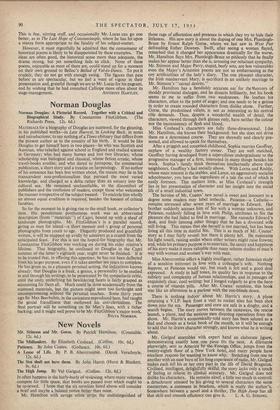Norman Douglas
MATERIALS for a biography of Douglas are scattered, for the gleaning, in his published works—in Late Harvest, in Looking Back, in notes and introductions; to say nothing of a Times obituary that differs from the present author as to the country of his birth. It would be like Douglas to get himself born in two places—he who was Scottish and Austrian, who-rebelled against school in England and studied science in Germany; who had many homes and lost two libraries; whose scholarship was biological and classical, whose fiction erratic, whose travel-books erudite; and who dared to juxtapose, for commercial publication, a short story and a treatise on herpetology. If no author of his eminence has been less written about, the reason may lie in his transcendent non-professionalism that pursued the most varied knowledge, and charged as a delta rather than an estuary into the cultural sea. He remained unclassifiable, to the discomfort of publishers and the confusion of readers, except those who welcomed the manner irrespective of the subject treated. To encircle him wholly an almost equal erudition is required, besides the keenest of critical faculties.
So for the moment he is giving rise to the small book, or collector's item. His penultimate posthumous work was an abbreviated description (from "materials"), of Capri, bound up with a sheaf of landscape photographs. Mr. FitzGibbon's is a parallel record, giving us man for island—a short memoir and a group of personal photographs from youth to age. Elegantly produced and gracefully written, it will be snapped up avidly by admirers as a crumb from the anticipated feast. For this is not the hoped-for biography that Mr. Constantine FitzGibbon was working on during his elder relative's lifetime. That biography, he confessed to Douglas in the Capri summer of the latter's eightieth year, might never be finished. It is to be trusted that, in offering this appetiser, he has not been deflected from his larger purpose, even if it takes another ten years to complete. He has given us, in a pleasant personal setting, the indications known already; that Douglas is a freak, a genius, a personality to be studied in and through his writings, to be penetrated by the sympathetic critic, until the unity underlying his bewildering facets is fairly grasped as accounting for them all. Much could he done academically from the scattered materials, but the picture might seem too forthright and uncompromising without the personal touches. Some thirty years ago Sir Max Beerbohm, in the caricature reproduced here, had caught the genial friendliness that mellowed his anti-clericalism. The final portrait will be something on Sir Max's lines, with a richer backing; and it might well prove to be Mr. FitzGibbon's major work.
SYLVA NORMAN.


























 Previous page
Previous page